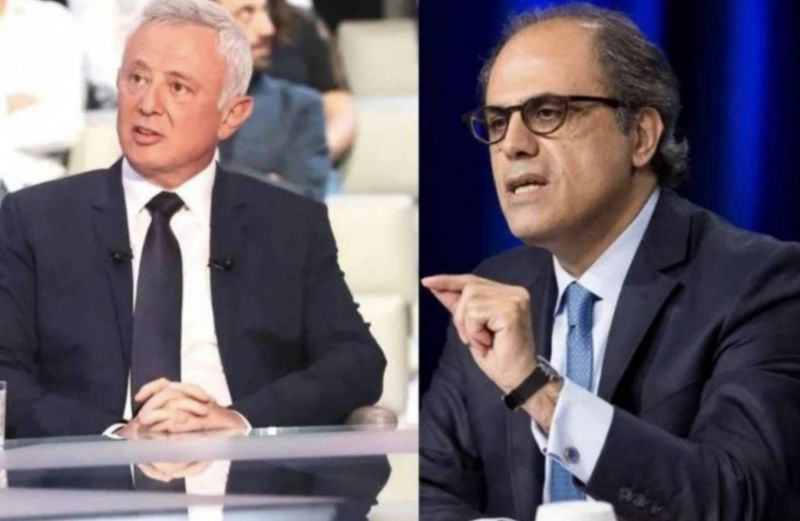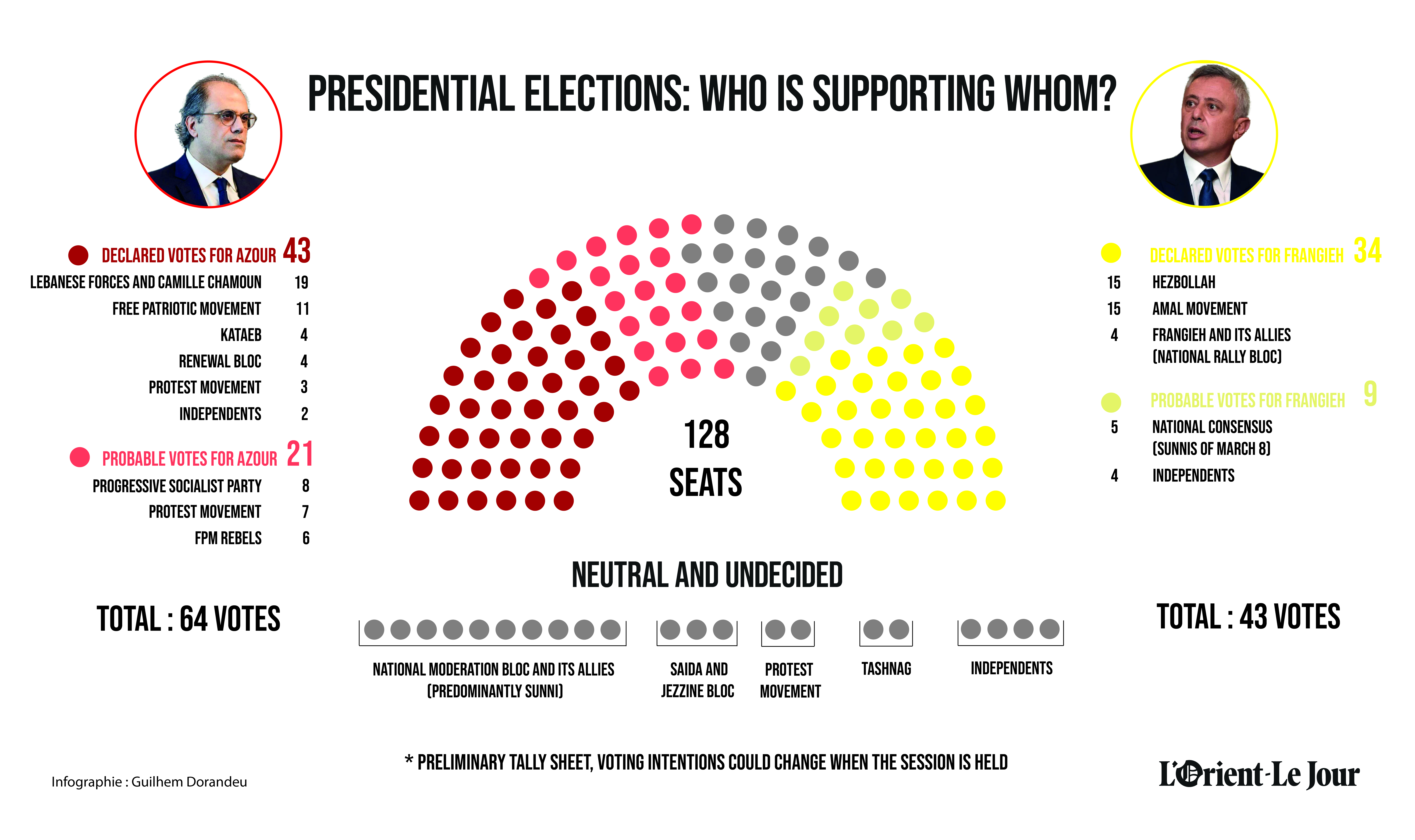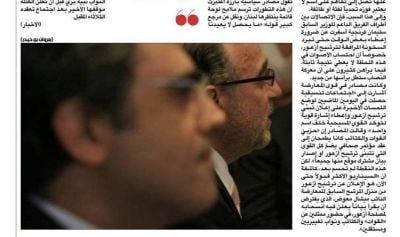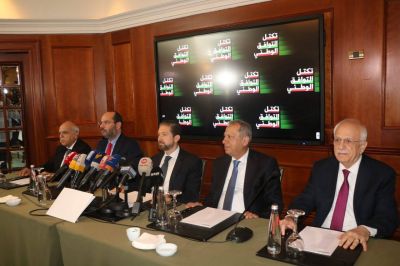
Sleiman Frangieh (left) and Jihad Azour (right). (Photos taken from Twitter)
Five months after the failure of the last electoral meeting, Parliament Speaker Nabih Berri has set the 12th session. With the aim of electing a president, the session is set to take place on Wednesday June 14.. Under pressure — notably by Washington — to convene the MPs to vote, Berri argued that he was “waiting to have at least two serious candidates” run before taking action.
Over the weekend, the most opposition parties and the Free Patriotic Movement (FPM) formalized their support for former Finance Minister and International Monetary Fund (IMF) official Jihad Azour against Marada leader Sleiman Frangieh, the Amal and Hezbollah favorite.
“Jihad Azour has the capacity to obtain more than 65 votes [the number required for a second round],” said MP Mark Daou on Sunday, announcing the opposition’s support for the International Monetary Fund’s senior official.
Of course, this score alone is not enough to get Azour elected, since Frangieh’s supporters could very well skip the meeting entirely, to create a lack of quorum which would prevent a second round from taking place.This is what they did to block the Michel Moawad, the opposition’s former preferred candidate.
Nonetheless, the session will be an opportunity for Azour to establish himself as a serious contender for the presidency, especially if he gets a higher score than his rival, who is also expected to face the ballot box for the first time.
Who will emerge from Wednesday’s session with the upper hand? L’Orient-Le Jour takes a first look.
Who will vote for Jihad Azour?
The Director of the Middle East and Central Asia Department of the IMF is assured of the support of at least 43 MPs: those of the Strong Republic bloc, comprised of the Lebanese Forces (LF) and Camille Chamoun (19 MPs), Sami Gemayel’s Kataeb (four MPs) and Michel Moawad’s Renewal bloc (four MPs). In addition, there are two independent MPs, Bilal Houshaymi (Zahle) and Ghassan Skaff (Bekaa West), as well as three protest movement MPs (Mark Daou, Najat Aoun and Waddah Sadek).
Theoretically, the FPM’s Strong Lebanon bloc, which has 17 MPs, in addition to two Tachnag MPs, are also expected to support Azour’s candidacy. However, some of its members may not respect the voting instructions and only 11 votes are guaranteed to Jihad Azour, which are those of Gebran Bassil’s main lieutenants. The party’s rebels, who would have preferred the bloc to nominate one of their own members, Metn MP Ibrahim Kanaan, rather than Jihad Azour, could cast a blank vote.
“I won’t be blindly following any instructions. I want to meet Azour and see if his political and economic vision matches mine,” Farid Boustany, MP for Chouf and independent member of the Strong Lebanon bloc, told L’Orient-Le Jour.
But Bassil is working hard to ensure that the party does not split its votes during the June 14 session to boost Azour’s score by another six votes, going so far as to implicitly threaten the troublemakers on Sunday.
On the opposition side, it is also uncertain whether Azour can count on the support of the eight Democratic Rally MPs, affiliated with Walid Joumblatt’s Progressive Socialist Party (PSP).
While Joumblatt was one of the first to put forward Azour’s name, he seems reluctant to support him explicitly. “We think he has the right profile, but we want him to be the subject of consensus, not a confrontational figure,” said a PSP source, in reference to Hezbollah’s veto. Joumblatt’s bloc is scheduled to meet this week to decide on the PSP’s position.
Similarly, Azour could win up to seven votes from the protest movement’s twelve MPs. “We’re waiting to meet him, but we think that despite his affiliation with figures in the ruling class, he’s the least worst option,” said a protest movement MP, in reference to Azour’s close ties to former Prime Minister Fouad Siniora. If the stars are aligned on June 14, Azour could win 64 votes. One vote short of the sacrosanct absolute majority.
Who will vote for Sleiman Frangieh?
Will Frangieh’s supporters slip his name into the ballot box? Until now, to avoid discrediting their candidate, the pro-Hezbollah camp’s MPs voted blank. But since then, the Amal-Hezbollah MPs officially named Frangieh as their candidate and are working hard to ensure that he gets as many votes as possible. They may, however, continue to vote blank to avoid a bitter second place.
But if they end up playing the game, Frangieh will certainly get at least 34 votes: he can surely count on the support of the 30 Amal-Hezbollah MPs (15 each), in addition to the four votes of the Marada’s national rally bloc and their independent allies.
Others are also expected to join his camp, like the pro-Hezbollah Sunni MPs of Faisal Karami’s national consensus bloc. Although they have not yet announced their support for Frangieh’s candidacy, the proximity and political alignment between Karami and Mr. Frangieh leaves little room for doubt.
Added to these votes are those of four independent MPs likely to join the March 8 candidate: Jihad al-Samad (Tripoli), Abdul Karim Kabbara (Tripoli), Haidar Nasser (Tripoli) and Jamil al-Sayyed (Baalbeck-Hermel). If they join the pro-Frangieh camp, these MPs would bring the Marada leader’s score to 43. Although this figure is lower than that of Azour, it is enough to prevent a second round of voting.

Neutral and undecided
The two candidates can also look for support among the undecided MPs, since not all blocs have made up their minds yet. These include the National Moderation bloc and its allies which are the real kingmakers.
This predominantly Sunni rally, made up of the six MPs of the above-mentioned bloc, as well as independent MP Neemat Frem (Kesrouan), Jamil Abboud (Tripoli), Nabil Bader (Beirut) and Imad el-Hout (Beirut), said it will not announce a final position before the session.
“We expect to meet Jihad Azour in the next few days,” said Akkar MP Sagih Attieh, a member of the bloc. “We will agree on a joint position after that,” he added.
However, a parliamentary source said that the votes of this group of MPs could be easily divided between the two candidates. “Neemat Frem and Jamil Abboud could vote for Jihad Azour in order to respect the consensus that has emerged among Christians, while some MPs for the north would rally behind Sleiman Frangieh,” the source said.
Similarly, the Tachnag, which has two MPs, after excluding George Boujikian from its ranks, is still unclear about its position and could easily go one way or the other, or even vote blank. “When the FPM announced its position, the Tachnag withdrew,” said an FPM MP.
A number of independent MPs also expressed their rejection of the two options presented: this is the case of protest movement MPs Halime el-Kaakour and Cynthia Zarazir, as well as Michel Daher, despite being elected under the label of opposition to Hezbollah.
“Neither Frangieh nor Azour represents a realistic option,” MP Abdul Rahman Bizri, a member of the Saida-Jezzine bloc, told L’Orient-le Jour. “We are looking for a third option that would be acceptable to all. As was Jihad Azour once.”
This article was originally published in French in L'orient-Le Jour. Translation by Joelle El Khoury.

